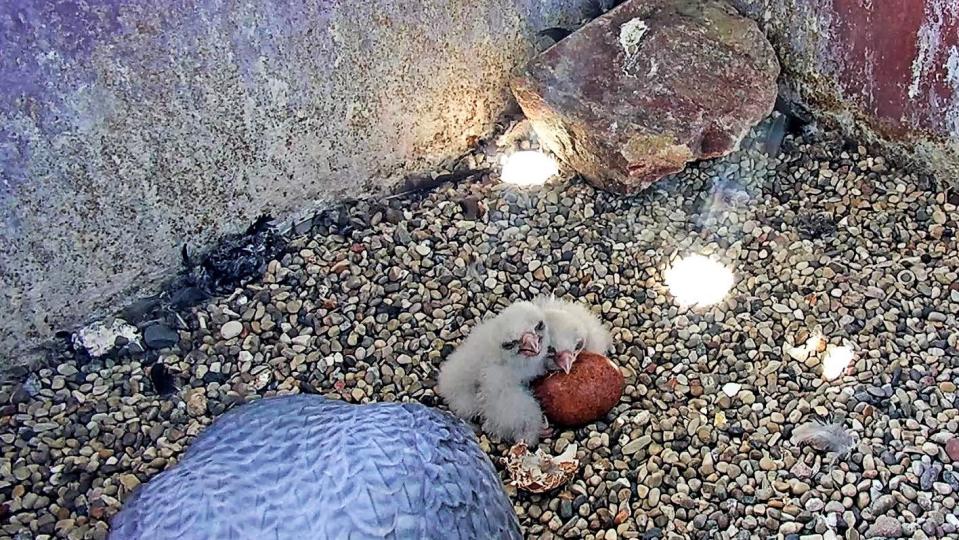Baby peregrine falcons recently hatched around Wisconsin. Here's how to see them
There are new little, fluffy faces popping up in nests around Wisconsin.
Earlier this week, three peregrine falcon chicks hatched at the Weston Power Plant in the Rothschild area south of Wausau. And in late April, four baby peregrine falcons entered the world at Essity's paper mill in Menasha.
This isn't the first time the two facilities have become homes for the birds.
More than 400 chicks have been born at Wisconsin Public Service Corp. and We Energies power plants in Wisconsin and Michigan since the companies’ peregrine falcon recovery programs began in 1992, according to a news release. Meanwhile, this is the ninth straight year that peregrine falcons have come to lay and hatch eggs at the Menasha mill, Essity said its own news release.
"We like to see them every year and have them around the mill while we work," Joe Geiger, Essity's environmental manager for the Midwest region, said in a statement.
What happens after the peregrine falcons are born?
In a few weeks, the newly-hatched peregrine falcons at the Weston Power Plant will be named after some of Wisconsin's most beloved college mascots, which were selected by thousands of people who voted in a contest, according to WPS.
Like the falcons born recently at the Menasha paper mill, the chicks at the power plant will also receive identification bands, which allow to researchers to study and track the falcons throughout their lives.
"The bands, which don’t hurt the birds or restrict their movement, are put on their legs so experts can observe their health and changes in bird populations," according to Essity's news release. "Band numbers are entered into a national registry."
The Menasha team works with Greg Septon — the founder of the Wisconsin Peregrine Falcon Recovery Project — to "band" the birds at the right time after birth, the release states.
The falcons born at the Essity mill hadn't been named as of Tuesday morning. But the birds' annual return "is closely watched and enjoyed" by the employees at the Menasha mill, the company said, through a "falcon cam" that was installed in 2017.
The falcons keep coming back to a nesting box employees created on a boiler stack to lay and hatch their eggs.
“It’s probably because it’s a high location that seems safe to them," Geiger said.
A female falcon typically lays up to four eggs in late March or early April that hatch about 30 days later, according to Essity.
Peregrine falcons recovered from 'the brink of extinction'
Peregrine falcons "were driven to the brink of extinction," and the species was federally listed as an endangered species in 1973, according to the National Park Service.
The population declined "due to problems with egg-shell thinning caused by persistent organic pollutants such as DDT," the park service said. By reducing DDT in the environment, though, peregrine falcons had a chance to recover, according to the agency, and the American peregrine falcon was removed from the endangered species list in 1999.
However, the Wisconsin Department of Natural Resources still lists the falcons as endangered in the state.
"Urban and industrial sites that provide nest boxes contribute greatly to the stability of the peregrine population in the state," Septon said in an email to The Post-Crescent email Tuesday evening. "Of the 39 successful nests last year, only 11 (28%) were on natural cliffs, so the human built environment and especially sites where nest boxes are provided remain vital to maintaining the population at the current levels."
Septon has spent decades supporting peregrine falcons. When asked what fascinates him, personally, about the bird, Septon replied, "I've always marveled at peregrines, their superb, mind blowing aerial skills, their amazing stoops, their dedication as protective parents and the generally remote — yes, even a nest box atop a paper mill can seem like another world when you're there — places they call home."
Where can I watch peregrine falcons webcams in Wisconsin?
Nest box livestreams are available to the public from:
WPS and We Energies in Rothschild, Oak Creek, Milwaukee and Port Washington at wecenergygroup.com/environment/falcons/.
University of Wisconsin-Oshkosh's Gruenhagen Conference Center at uwosh.edu/sirt/peregrine-falcons/.
University of Wisconsin-Green Bay's David A. Cofrin Library at uwgb.edu/biodiversity/peregrine-falcon-cam/.
Briess Malt & Ingredients Company's Manitowoc plant at about.briess.com/sustainability-program/falcon-recovery-program.
Veolia Water Milwaukee on top of the Milorganite building at veolianorthamerica.com/milwaukee/sustainability/protecting-biodiversity/live-falcon-camera.

Reach Becky Jacobs at bjacobs@gannett.com or 920-993-7117. Follow her on Twitter at @ruthyjacobs.
This article originally appeared on Appleton Post-Crescent: Essity, WPS Weston Power Plant home to new peregrine falcons chicks

